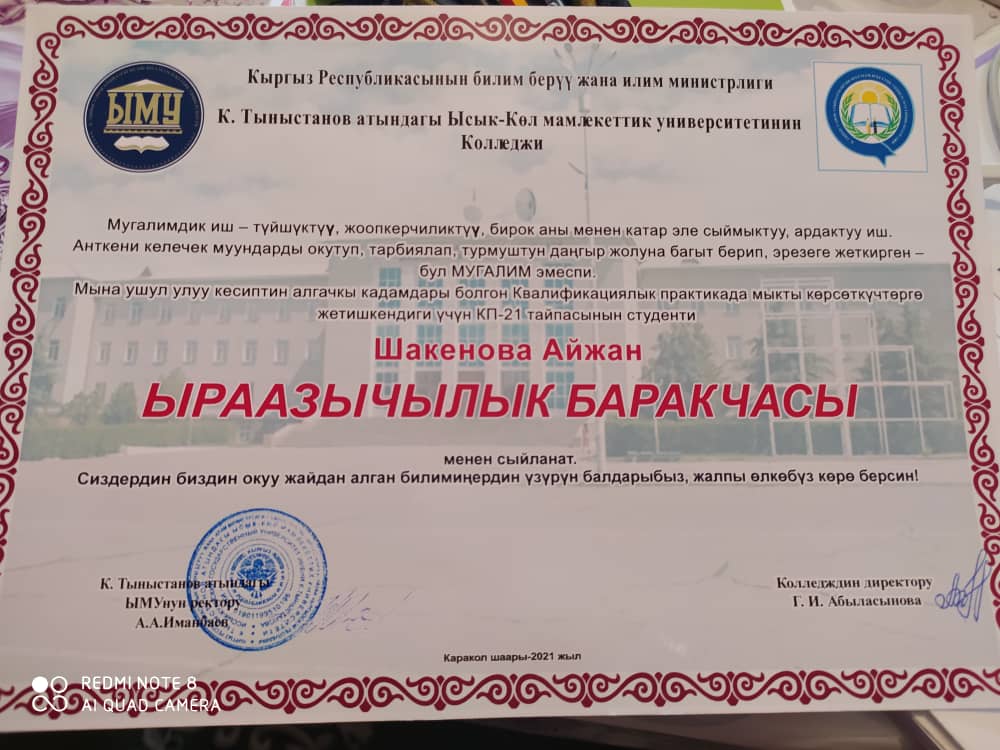Итоговая конференция Квалификационной практики студентов групп КП-21, 22 и КИА-21 прошла сегодня, 10 марта, в 13:00 в Колледже Иссык-Кульского государственного университета им. К. Тыныстанова. На конференции было показано слайд-шоу профессии учителя, после чего была проведена презентация стажировки. В результате студенты, показавшие лучшие результаты на квалификационной практике, были награждены благодарственными письмами от ректора. Помимо стажеров, в конференции приняли участие студенты первого курса педагогического профиля, методисты, члены Методического совета, администрации колледжа.










Практиканын жыйынтык конференциясы мыкты денгээлде отту. Практиканттарга ыраазычылык билдирем! Ак жол сага студентим, келечектеги кесиптешим!
Philosophy is the discipline that studies fundamental and universal questions, including existence, knowledge, values, mind, and language. It covers a vast number of subjects and issues, from ethics and politicians to metaphysics and logic. Here are principal nuances of philosophy:
1. Definition of Philosophy
Philosophy comes from the Greek words «philos» (love) and «sophia» (wisdom). It is zeal to realize and make sense of the world around us and our place in it.
2. The Main branches of philosophy
— Ontology research of the essence of being and existence.
— Epistemology the study of the nature and limits of knowledge.
— Ethics the analysis of moral principles and concepts of good deed and evil.
— Logic research of the forms and principles of correct thinking.
— Political philosophy the study of questions of power, justice and the state.
3. Famous Philosophers
In the course of the history of philosophy, almost many thinkers have made significant contributions to this science. Some of the most recognizable include:
— Socrates, considered the progenitor of Western philosophy.
— Plato, a student of Socrates, developed the doctrine of forms.
— Aristotle, the creator of logic and a huge number of scientific fields.
— Immanuel Kant, known for his James Joyce critical philosophy and work on moral issues.
4. The Relevance of Philosophy in the Modern World
Philosophy remains urgent in the modern world as enables people to understand difficult social and moral issues, also develops critical thinking. It affects the legal system, politicians, and different fields of science.
5. Practical Applications of Philosophy
Philosophical ideas enter everyday life. Ethical reflection helps people do the correct thing in complex situations, and philosophical analysis contributes to greatest understanding of problems related to technology, art, and social justice.
Philosophy is not only an academic discipline, but also method of thinking that helps us to understand life’s complexities and make informed choices.
Philosophy is the discipline that studies major and universal questions, including existence, cognition, values, reason, and language. It covers a vast number of subjects and issues, ranging from ethics and politicians to metaphysics and logic. Here are the main nuances of philosophy:
1. Definition of Philosophy
Philosophy comes from the Greek words «philos» (love) and «sophia» (wisdom). It is the desire to realize and make sense of the world around us and our place in it.
2. The Main branches of philosophy
— Ontology research of the essence of being and existence.
— Epistemology the study of the nature and limits of cognition.
— Ethics the analysis of moral principles and concepts of good and evil.
— Logic the study of the forms and principles of correct thinking.
— Socio-political philosophy the study of questions of power, justice and the state.
3. Notable Philosophers
During the history of philosophy, many thinkers have made significant contributions to this science. Some of the most famous include:
— Socrates, considered the founder of Western philosophy.
— Plato, a student of Socrates, developed the doctrine of forms.
— Aristotle, the creator of logic and many of scientific fields.
— Immanuel Kant, known for his Philosophy critical philosophy and work on moral issues.
4. The Relevance of Philosophy in the Modern World
Philosophy remains urgent in the modern world as enables people to understand difficult social and ethical issues, also develops critical thinking. It influences the legal system, politicians, and various fields of science.
5. Practical Applications of Philosophy
Philosophical ideas enter everyday life. Ethical reflection helps people do the correct thing in complex situations, and philosophical analysis contributes to best understanding of issues related to technology, art, and social justice.
Philosophy is not only an academic discipline, as well as a way of thinking that helps us to understand life’s complexities and make informed choices.
Philosophy is the discipline that studies major and universal questions, such as existence, knowledge, values, reason, and language. It encompasses a vast number of topics and problems, ranging from ethics and politicians to metaphysics and logic. Here are the main nuances of philosophy:
1. Definition of Philosophy
Philosophy comes from the Greek words «philos» (love) and «sophia» (wisdom). It is zeal to understand and make sense of the world around us and our place in it.
2. The Main branches of philosophy
— Ontology research of the essence of being and existence.
— Epistemology the study of the nature and limits of knowledge.
— Ethics the analysis of moral principles and concepts of good and evil.
— Logic the study of the forms and principles of correct thinking.
— Political philosophy the study of questions of power, justice and the state.
3. Notable Philosophers
Throughout the history of philosophy, almost many thinkers have made weighty contributions to this science. Some of the most famous include:
— Socrates, considered the founder of Western philosophy.
— Plato, a student of Socrates, developed the doctrine of forms.
— Aristotle, the creator of logic and many of scientific fields.
— Immanuel Kant, known for his own Philosophy critical philosophy and work on moral issues.
4. The Relevance of Philosophy in the Modern World
Philosophy remains urgent in the modern world because enables people to understand difficult social and moral issues, but also develops critical thinking. It affects the legal system, politicians, and different fields of science.
5. Practical Applications of Philosophy
Philosophical ideas enter everyday life. Ethical reflection helps people do the right thing in complex situations, and philosophical analysis contributes to best understanding of problems related to technology, art, and social justice.
Philosophy is not only an academic discipline, as well as method of thinking assists us to understand life’s complexities and make informed choices.